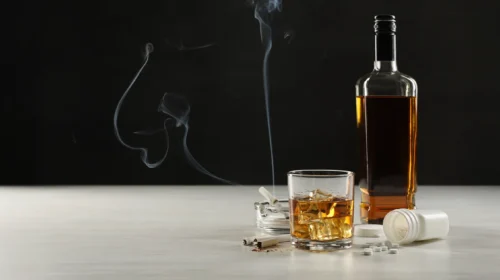We’ve all heard the phrase “sex, drugs, and rock and roll,” and frankly, it’s incredibly misleading, given what drug addiction does to your sex life. In addition to lowering your inhibitions and causing you to engage in more risky sexual behavior, drugs, and alcohol affect intimacy in a variety of negative and potentially critical ways.
For all of the pop-culture depictions of people getting obliterated and hopping into bed (or couch, or floor, or partially rotted out 1985 Pontiac Trans Am) with anyone they see, there’s little discussion of what can and often does happen when the lights go out. Chronic abuse of illicit drugs and alcohol can affect your sex life and relationships in ways you may not realize and don’t want to find out.
Let’s Start With A Drink: How Does Alcohol Affect Sex Drive, Performance And Longevity?
When you take someone home from the bar or hook up at a party after you’ve both had a few, don’t be surprised if that’s where it ends. While alcohol use may interfere with a genital response and inhibit your ability to perform, it does not uniformly increase testosterone levels in both men and women to boost sexual arousal. People often ask, “Does alcohol make a man last longer in bed?”
The answer is that no evidence shows that alcohol consumption helps men sustain an erection for a longer period of time. It may desensitize you temporarily. But the impact of alcohol abuse, like chronic heavy drinking or a pattern of regular binge drinking, on your sex life generally only gets worse over time, leading to issues like low libido, erectile and orgasm dysfunction, premature ejaculation, decreased blood flow to the penis in males and vaginal dryness in women. Data suggests that erectile dysfunction is common in alcoholic males.
Alcohol And Libido: It’s Complicated
Responsibly drinking alcohol can temporarily boost your libido or sexual drive. However, alcohol and libido have a complicated relationship.
Alcohol is a central nervous system (CNS) depressant. While initially, one may feel uninhibited and ready for anything, this is a fleeting sensation and not a long-term solution for healthy sexual activity. Over time, chronic alcohol abuse can lower your levels of the hormones and chemicals involved in libido: testosterone, dopamine, and serotonin, so your “party self” becomes far less interested in keeping the party going in the bedroom.
Alcohol may act like a libido enhancer while you’re under the influence, but the long-term ramifications of alcohol use or abuse can lead to negative sexual health consequences.
Do Illegal Drugs Cause Erectile Dysfunction Or Affect Your Sex Life In Other Ways?
Studies show that males who use various illegal drugs are more likely to experience negative consequences with regard to their sex life. Erectile dysfunction (ED) and lower libido are most common in those who abuse opioids such as heroin, amphetamines like meth, and MDMA (Ecstasy). Abusing virtually all illegal drugs is likely to cause increased ejaculation latency. Let’s explore the impact of other specific drugs and their effect on your sex life.
The Party (Is Over) Drug: Effects Of Cocaine On Your Sex Life
Cocaine is, perhaps, the illicit drug most associated with partying. It brings to mind powdery, anything-goes, orgy-like settings where inhibitions are left outside at the door, and the adrenaline is through the roof. There’s no question that cocaine and other stimulant drugs increase short-term sex drive, but performance and longevity are another story. Like alcohol, long-term abusers of cocaine develop sexual dysfunction issues, including an inability to achieve or sustain an erection and vaginal dryness. Additionally, prolonged cocaine abuse can lead to reduced sperm count in men.
How Do Opioids Affect Your Sex Life?
Abuse of opioids can affect your sex life in a number of damaging ways. Long-term use of opioids can affect sex hormones in the brain by releasing the gonadotropin-releasing hormone (GnRH) in excess. One study indicated that long-term opioid users were nearly 70 percent more likely than non-users to experience dissatisfaction with their sex life and more than twice as likely to experience low or no desire.
Short-term opioid users reported low desire and sexual dissatisfaction at a rate of 82 and 35 percent, respectively. Prescription opioids like Vicodin® and OxyContin® can decrease testosterone levels, which can negatively impact sexual desire, particularly in men.
As heroin and fentanyl share many of the same molecular properties as prescription opioids, the effects on sexual performance are often largely the same, depending upon your specific use history.
Do Benzodiazepines Affect Your Sex Life?
Benzodiazepines, aka “Benzos” such as Xanax, are another class of drugs that are often misused. Does Xanax affect you sexually? Yes, it can. Benzos impact your central nervous system. Abuse these drugs, and you may find that your sex drive is reduced, you can’t reach orgasm, or you have ED.
Effects Of Meth On Sex Life And Sexual Health
Like cocaine and other stimulant drugs, meth may increase sexual desire in the short term but can have a drastic negative impact on sexual function and health as use persists. Prolonged and untreated meth abuse is linked to lower libido, decreased testosterone, inability to orgasm, erectile dysfunction, vaginal dryness, and a host of other sexual health issues.
It’s important to realize that the longer drug or alcohol abuse persists, the harder it may be to overcome these symptoms, creating a vicious cycle of substance abuse and sexual dysfunction, in addition to other physical and psychological health issues. It’s important to integrate a focus on sexual health into treatment.
The Effects Of Drugs And Alcohol On Relationships And Intimacy
Few things kill the mood quicker than not being able to trust, respect, or be comfortable with your significant other. Relationships in which one person uses, and the other is sober are fraught with communication, trust, boundary, and respect issues that can affect sexual intimacy and desire.
Simply put, if you’ve been lying through your teeth to your partner about your drug use or come home under the influence of coke or meth, you can’t expect them to be ready to perform sexually. Or if you can’t perform because the alcohol and libido equation has reached a negative state, your partner may become suspicious that you’re spending your sexual energy elsewhere.
Over time these issues become more and more difficult to bounce back from and can permanently derail your relationship. Data from the American Society of Addiction Medicine indicates that substance abuse is present in a significant portion of all incidents of intimate partner violence (IPV).
Sexual Health Risks Of Alcohol And Drug Addiction
Just because alcohol and some illicit drugs can, at first, increase sexual desire, that’s not always a good thing. Engaging in sexual activity, especially having unprotected sex when you’re drunk or high, can lead to a variety of health risks, including but not limited to sexually transmitted diseases, sexual violence and sexual assault, unwanted pregnancy, and more. The risk of sexually transmitted diseases like HIV/AIDS is particularly high among homosexual males, but these factors disproportionately affect the LGBTQ+ population as a whole. Recovery Unplugged offers compassionate and effective treatment that specifically addresses the unique clinical and behavioral health needs of the LGBTQ+ community.
Injection drug users are particularly vulnerable to sexually transmitted diseases. Data from the CDC published by the National Institute on Drug Abuse (NIDA) indicates injection drug use (IDU) contributes to nearly 20 percent of recorded HIV cases among men. The CDC also reports:
- Alcohol use disorder can be a crucial risk factor for HIV because it is linked to risky sexual behaviors and, among people living with HIV, can hurt treatment outcomes.
- Opioids are often associated with HIV risk behaviors, such as needle sharing when infected and risky sex, and have been linked to a recent HIV outbreak.
- Methamphetamine (meth) is associated with risky sexual behavior that places people at greater HIV risk. It can be injected, which also increases HIV risk if people share needles and other injection equipment.
- Crack and powder cocaine can create a cycle in which people quickly exhaust their resources and turn to other ways to get the drug, including trading sex for drugs or money, which increases HIV risk.
- Inhalants are commonly linked to risky sexual behaviors, illegal drug use, and sexually transmitted diseases among gay and bisexual men.
A 2019 study published by the CDC also found that meth, heroin, and different types of injection drug use contribute to higher rates of primary and secondary syphilis.
Overcoming Sexual Function Issues In Addiction Treatment
The time it takes for hormone levels to return to normal and for sexual dysfunction to abate after abstaining from alcohol varies significantly among individuals. Those who ask, “How long after quitting drinking does ED go away?” may be disappointed to find that, unfortunately, alcohol and drugs can affect sex life even after treatment and in long-term recovery.
For those still suffering impotence after sobriety, there are certain measures men can take to address the problem. Both men and women may be able to increase their sexual desire and satisfaction in sobriety with therapies. This includes medications and ongoing sex therapy, either by yourself or with your partner.
While alcohol dependence and drug abuse can affect mental health, the relationship between sexual identity and substance abuse is complex and not necessarily direct. It is important to consider individual factors in treatment.
The first step to overcoming the sexual effects of drugs and alcohol is getting treatment for your substance use disorder. Recovery Unplugged is ready to help you or your loved ones reclaim your life from drugs and alcohol with comprehensive care, including medical detox and withdrawal management, as well as comprehensive behavioral rehab.
Our therapists are able to help you unravel the complex relationships between your sexual behavior and your drug and alcohol abuse. We offer multiple locations and accept most major insurances. Contact us today to start your treatment now.

























